 Petzlover
Petzlover Braque d'Auvergne is originated from France but Longhaired Weimaraner is originated from Germany. Both Braque d'Auvergne and Longhaired Weimaraner are having almost same height. Braque d'Auvergne may weigh 22 kg / 49 pounds more than Longhaired Weimaraner. Both Braque d'Auvergne and Longhaired Weimaraner has almost same life span. Both Braque d'Auvergne and Longhaired Weimaraner has almost same litter size. Braque d'Auvergne requires Low Maintenance. But Longhaired Weimaraner requires Moderate Maintenance
Braque d'Auvergne is originated from France but Longhaired Weimaraner is originated from Germany. Both Braque d'Auvergne and Longhaired Weimaraner are having almost same height. Braque d'Auvergne may weigh 22 kg / 49 pounds more than Longhaired Weimaraner. Both Braque d'Auvergne and Longhaired Weimaraner has almost same life span. Both Braque d'Auvergne and Longhaired Weimaraner has almost same litter size. Braque d'Auvergne requires Low Maintenance. But Longhaired Weimaraner requires Moderate Maintenance
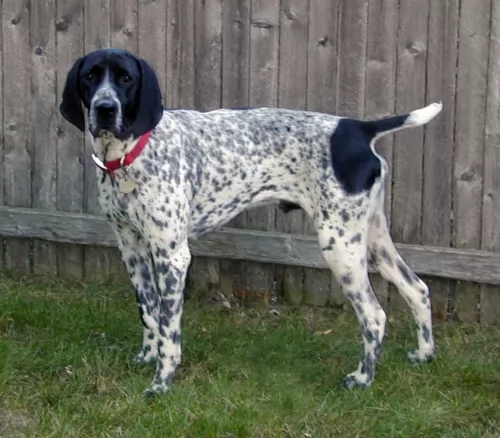 Sometime over 5 centuries ago, in the Cantal Region of France, was born a hunting breed, that might be the real ancestor of today’s pointing hunter dogs. Perhaps the oldest of all pointing gun dog is the Braque d’Auvergne. This breed comes from Central France in the region of Auvergne. This breed was developed prior to written dog breeding records in order to hunt in this region and find, point, flush out and retrieve fowl. This breed is clearly one of if not the oldest breeds in the French Braque. There is no agreement among historians on what breed is the oldest of the European pointing dogs and where they were developed – was it Spain or was it France? It is thought that the Braque Francais Gascogne is the original one of these in the early 1600’s while the Braque d’Auvergne came soon after. Due to the different hunting needs in the different parts of France, the Braque Francais Gascogne was crossed with a lot of other local scent hounds. The Braque d’Auvergne is one of the very oldest of all of these. There are records of the breeds existence in the 1700’s. It is probable that the Braque d’Auvergne was developed by crossing local dogs with Gascogne as well as with the Petit Bleu de Gascogne and the Grand Bleu de Gascogne.
Sometime over 5 centuries ago, in the Cantal Region of France, was born a hunting breed, that might be the real ancestor of today’s pointing hunter dogs. Perhaps the oldest of all pointing gun dog is the Braque d’Auvergne. This breed comes from Central France in the region of Auvergne. This breed was developed prior to written dog breeding records in order to hunt in this region and find, point, flush out and retrieve fowl. This breed is clearly one of if not the oldest breeds in the French Braque. There is no agreement among historians on what breed is the oldest of the European pointing dogs and where they were developed – was it Spain or was it France? It is thought that the Braque Francais Gascogne is the original one of these in the early 1600’s while the Braque d’Auvergne came soon after. Due to the different hunting needs in the different parts of France, the Braque Francais Gascogne was crossed with a lot of other local scent hounds. The Braque d’Auvergne is one of the very oldest of all of these. There are records of the breeds existence in the 1700’s. It is probable that the Braque d’Auvergne was developed by crossing local dogs with Gascogne as well as with the Petit Bleu de Gascogne and the Grand Bleu de Gascogne.
In all of Western Europe, the region of Auvergne is not very populated and has unique geography in that is hilly and has many extinct and eroded volcanoes. A lot of the region is still unpopulated. In this environment, wildlife has flourished, and hunting is successful in providing food for the regions people. This circumstance with an abundance of birds, led to the breeding of the Braque Auvergne to specialize in hunting in this area. The breed is not very popular outside of Auvergne and probably never was. That fact allowed them to be devastated by the Second World War. The Reunion des Amateurs de Braque d’Auvergne (RABA) was started to promote the pure breeding and the protection of the d’Auvergnes. But when Auvergnes was occupied during the war, the slowed breeding of the Braque d ‘ Auvergne almost eliminated the breed. There might have only been about 25 dogs left following the end of the war. These remaining dogs were used to revive the breed, but it is still uncommon, but not rare. Individuals have been imported by other countries including North America. The United Kennel Club (UKC) accepted the breed in 2006 but is not accepted by the AKC (American Kennel Club). The breed is still a working breed and outside of France, very rare.
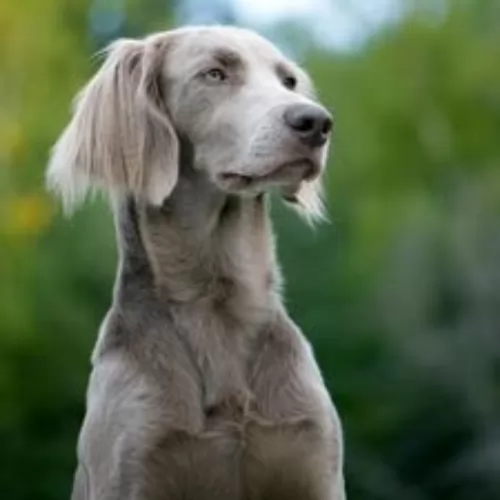 You may be used to the sleek, silver shorthaired Weimaraner, but did you know you get a beautiful long haired version too? Known also as the Long Coated Weimaraner or the ‘Gray Ghost’, with its mesmerising amber eyes, the less common long haired variety shares a similar history as the more familiar short haired version.
You may be used to the sleek, silver shorthaired Weimaraner, but did you know you get a beautiful long haired version too? Known also as the Long Coated Weimaraner or the ‘Gray Ghost’, with its mesmerising amber eyes, the less common long haired variety shares a similar history as the more familiar short haired version.
The dog originates in Germany and was developed to be a hunting dog. It is believed that the silver dog dates back to the early 1800’s, and in 1897 the first breed club in Germany was formed to protect the future of this dog.
The longhair coat is recognized in all countries except the American Kennel Club.
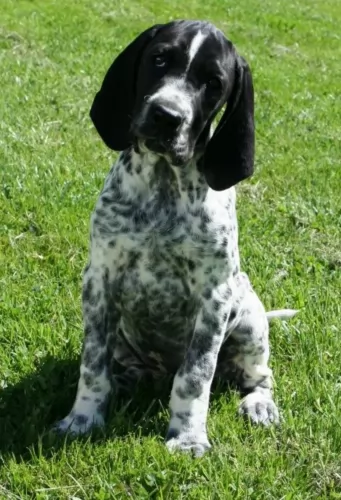 The Braque d’Auvergne is a well built, strong hunting dog with long ears, a large head and a docked tail. His coat is white with black markings and black ears and head. The breed looks a lot like all the other pointing dogs from France. They are medium in stature and has the appearance of a working gundog. He is athletic, muscular and fit. Docking the tail is outlawed in many countries and all of the United Kingdom. In that case the tail is high on the rump and always straight. Their face and head are big for the size of the body and shaped like an oval. With a long muzzle, deep set eyes and a gentle expression, they are kindly and handsome dogs. Their skin is loose but not droopy or wrinkled like hound dogs.
The Braque d’Auvergne is a well built, strong hunting dog with long ears, a large head and a docked tail. His coat is white with black markings and black ears and head. The breed looks a lot like all the other pointing dogs from France. They are medium in stature and has the appearance of a working gundog. He is athletic, muscular and fit. Docking the tail is outlawed in many countries and all of the United Kingdom. In that case the tail is high on the rump and always straight. Their face and head are big for the size of the body and shaped like an oval. With a long muzzle, deep set eyes and a gentle expression, they are kindly and handsome dogs. Their skin is loose but not droopy or wrinkled like hound dogs.
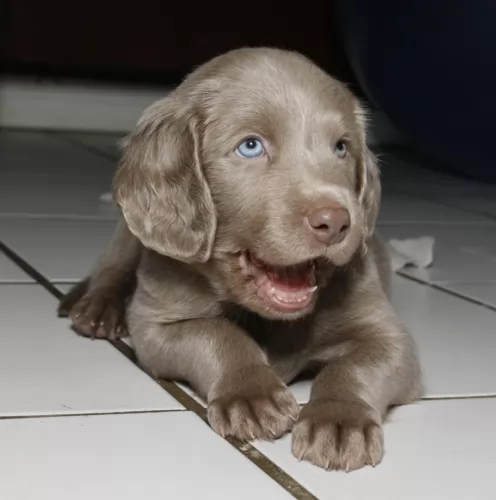 The Longhair Weimaraner with its eye-catching grey coat is a large dog that stands between 58 and 70cm and weighs between 25 to 40kg.
The Longhair Weimaraner with its eye-catching grey coat is a large dog that stands between 58 and 70cm and weighs between 25 to 40kg.
These dogs, unlike the short haired version, have the tail traditionally long and the tail is feathered. The eyes are a blue-green, amber or grey color. The grey coat is soft and silky and even though it is quite long, a brush twice a week will keep it in tip-top condition.
The Longhaired Weimaraner’s temperament is the same as the short haired variety. He is also a superb field dog with excellent hunting skills.
They’re very active dogs, looking for plenty of mental and physical stimulation. For first-time dog owners, this might prove to be too demanding, so the long haired Weimaraner might not be the best first-choice dog to get.
They can be aggressive when meeting new people and he will certainly require training and socialization if you want him to be calm and obedient.
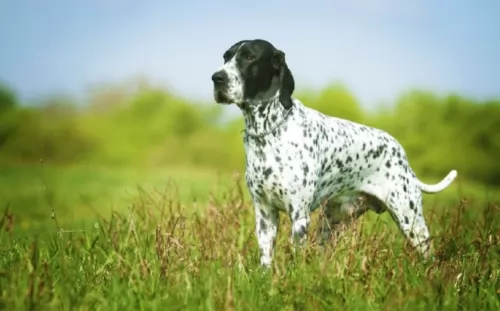 This is a gentle, adaptable and obedient breed. With their intelligence and affectionate nature, they make great family dogs and are eager to please their people. Living with other dogs is fine but not with small, prey size animals. The Braque d’Auvergne should never be left alone pets like gerbils and hamsters. They must be socialized to cats as pets and not prey before living with them successfully. They need to work closely with one human partner. They are first and foremost a hunting dog and need some sort of hunting simulation. They are devoted to their families and want to be constantly in their presence. This can lead to separation anxiety if they are left alone too much. They are great with children and need a family.
This is a gentle, adaptable and obedient breed. With their intelligence and affectionate nature, they make great family dogs and are eager to please their people. Living with other dogs is fine but not with small, prey size animals. The Braque d’Auvergne should never be left alone pets like gerbils and hamsters. They must be socialized to cats as pets and not prey before living with them successfully. They need to work closely with one human partner. They are first and foremost a hunting dog and need some sort of hunting simulation. They are devoted to their families and want to be constantly in their presence. This can lead to separation anxiety if they are left alone too much. They are great with children and need a family.
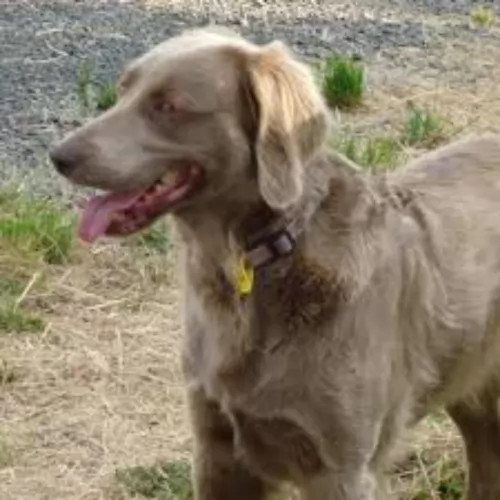 Your Long Haired Weimaraner is a friendly, alert dog that makes for an excellent companion and watchdog. The fact that he is also restless, confident, independent and strong-willed means that training and socialization will be necessary to make him pleasant and obedient.
Your Long Haired Weimaraner is a friendly, alert dog that makes for an excellent companion and watchdog. The fact that he is also restless, confident, independent and strong-willed means that training and socialization will be necessary to make him pleasant and obedient.
You can’t always count on him to be amicable as he also has a bit of an aggressive side.
The way your Long Haired Weimaraner turns out will depend on heredity, the personality of the owner as well as training and socialization.
These dogs want to be with their human family and will follow the owner around and contentedly lie at their feet. Once he's trained, the Weimaraner is guaranteed to make you a fine family companion.
 The Braque d’Auvergne is a healthy breed but can face some of the same health concerns as other pointers and hunting dogs. The long, droopy ears can get infected easily if wet and need to be cleaned regularly so that food or dirt are not trapped their either. Because of the small gene pool however they may be at risk for several issues. The breeders in France express concerns about possible hip dysplasia and testing is highly recommended. Because they are at risk for other conditions that might not show up until later in life, it is also recommended that they be tested by the Canine Eye Registration Foundation (CERF) as well as the Orthopedic Foundation for Animals (OFA).
The Braque d’Auvergne is a healthy breed but can face some of the same health concerns as other pointers and hunting dogs. The long, droopy ears can get infected easily if wet and need to be cleaned regularly so that food or dirt are not trapped their either. Because of the small gene pool however they may be at risk for several issues. The breeders in France express concerns about possible hip dysplasia and testing is highly recommended. Because they are at risk for other conditions that might not show up until later in life, it is also recommended that they be tested by the Canine Eye Registration Foundation (CERF) as well as the Orthopedic Foundation for Animals (OFA).
 Hip Dysplasia is a medical threat to all dog breeds and fortunately the Weimaraner is a dog breed that has a low rate of dysplasia. When buying a Long Haired Weimaraner, try and get one from breeders who have had their breeding dogs hip-tested.
Hip Dysplasia is a medical threat to all dog breeds and fortunately the Weimaraner is a dog breed that has a low rate of dysplasia. When buying a Long Haired Weimaraner, try and get one from breeders who have had their breeding dogs hip-tested.
You’ll notice that the Weimaraner is a deep-chested dog and he is prone to bloating, which can turn out to be life threatening for your dog if not treated immediately.
The stomach twists and is swollen with no bowel movements. The dog is restless and in distress and needs immediate attention. To help, instead of giving one large meal which is gobbled up quickly, give him 2 smaller meals.
Skin allergies are also quite common in these dogs and you don’t want your silver dogs coat going off as it is his crowning glory.
If he is scratching, his skin is dry, red and itchy, get him to the vet as it can even be parasites at work, causing an allergic reaction.
 The Braque d’Auvergne needs a high-quality diet fit for a working dog but not too much to make him obese. They are an active breed to choose a formula that is designed for working dogs.
The Braque d’Auvergne needs a high-quality diet fit for a working dog but not too much to make him obese. They are an active breed to choose a formula that is designed for working dogs.
Although no studies have been conducted on the Braque d’Auvergne’s health issues there are many conditions that similar breeds are susceptible to and the d’Auvergne might be as well. This includes any of the following:
This is an active, working dog who needs a lot of stimulation and exercise. The only real appropriate exercise for these dogs is hunting or outings in the woods. He not only needs the exercise, but he also needs to stimulate his sense of smell and his gundog intelligence. He might excel in lure chase or even a form or barn hunt. They certainly could excel at obedience trials and perhaps rally. If you are a weekend hunter then this is the ideal dog for you. They are so easy to train that they surpass other pointers for success with casual hunters. They hunt at a slower pace than many other gundogs. Their intelligence and athleticism lend itself well to agility and flyball also. They need a large (+acres)fenced in area to run and play.
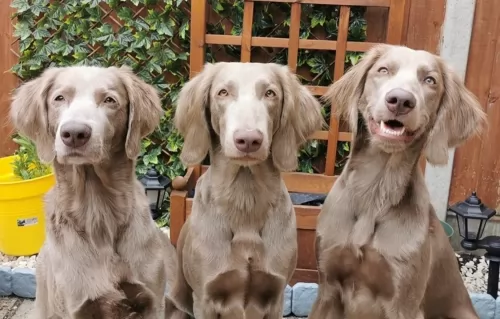 When you bring a Long Haired Weimaraner home, you will need to invest in brush and comb for his long hair. They’re active dogs and love nothing more than running in a field, rolling in mud and being very active.
When you bring a Long Haired Weimaraner home, you will need to invest in brush and comb for his long hair. They’re active dogs and love nothing more than running in a field, rolling in mud and being very active.
His coat will need to be brushed at least twice a week to keep it looking silvery and shimmering. Check the ears, eyes and teeth whenever you brush him and get used to cleaning his teeth regularly too.
If in doubt about how to keep your pet well groomed in terms of looks and health, speak to a dog expert, your vet or professional groomer.
Your ‘Gray Ghost’ dog has been a very successful hunting dog, and they are high-energy gun dogs. As a large dog he will have particular nutritional needs to fuel his energetic lifestyle.The dog’s high activity levels need to be taken into account when looking at his diet.
Buy the best commercially manufactured food. Add to his kibble some cooked chicken, brown rice or pasta and cooked or raw vegetables from time to time as well as bits of raw meat. Your dog will thank you for keeping his meals simple but nutritious.